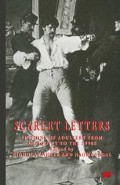Abstract
In the early decades of the nineteenth century the institution of marriage underwent a significant transformation: the profoundly misogynistic Civil Code, drawn up by Napoleon’s lawyers, established a new legal framework for marriage in an attempt to strengthen the authority of the husband, proved profoundly inimical to new expectations relating to marriage, and ran directly counter to the principles of liberty and equality which were part of the broad cultural legacy of the French Revolution. From 1830 marriage became the focus of considerable debate and gave rise to attempts to codify its underlying logic and a wide range of literary representations. The state of marriage was a question which was urgently addressed in many quarters, a sensitive subject of virtually universal concern. Literature clearly had a vital and, in some respects ambivalent, role in this collective preoccupation with marriage: the novel, in particular, both diagnosed and contributed to the difficulties of marriage. What is of particular interest, however, is the extent to which the novel reflected or was able, in some way, to maintain a critical distance from the conventional view of marriage. This question can be posed most acutely in relation to attitudes to adultery of the wife, which remained a central concern for much of the first half of the century, providing something of a test-case for theories about the relationship between ideology and literature.
Access this chapter
Tax calculation will be finalised at checkout
Purchases are for personal use only
Preview
Unable to display preview. Download preview PDF.
Notes
T. Eagleton, Ideology. An Introduction (London, Verso, 1991), pp. 1–31.
See K. Marx and F. Engels, The German Ideology, quoted in R. Williams, Marxism and Literature (Oxford, OUP, 1977), p. 59.
P. Macherey, Pour une Théorie de la production littéraire (Paris, Maspéro, 1970).
See T. Eagleton, Criticism and Ideology. A Study in Marxist Literary Theory (London, NLB, 1976).
A.J. Greimas, Du Sens (Paris, Editions du Seuil, 1970), pp. 142–3.
F. Jameson, The Political Unconscious. Narrative as a Socially Symbolic Act (London, Methuen, 1981), pp. 47–8.
See the views quoted in C. Nesci, La Femme Mode d’emploi. Balzac, de la ‘Physiologie du mariage’ à ‘La Comédie humaine’ (Lexington, French Forum Publications, 1992), p. 21.
See S. Heath, Gustave Flaubert. Madame Bovary (Cambridge, CUP, 1992), p. 78.
J. Weeks, Sex, Politics and Society: The Regulation of Sexuality since 1800 (London, Longman, 1981), p. 32.
P.J. Proudhon, De la Justice dans la Révolution et dans l’Eglise (1858), Oeuvres complètes, iv, Marcel Rivière,1935, p. 307 (quoted in Heath, op. cit., p. 81).
L. Rabine, ‘George Sand and the Myth of Femininity’, Women and Literature, 4 (1976), pp. 2–17.
This pattern has been discussed by N. Segal in The Adulteress’s Child: Authorship and Desire in the Nineteenth-Century Novel (Cambridge, Polity Press, 1992), pp. 62–114.
For a recent discussion of this preoccupation see C.A. Mossman, Politics and Narratives of Birth. Gynocolonization from Rousseau to Zola (Cambridge, CUP, 1993), pp. 19–71.
See A. Michel, Le Manage chez Honoré de Balzac. Amour el féminisme (Paris, Les Belles Lettres, 1978).
See C. Prendergast, Balzac: Fiction and Melodrama (London, Edward Arnold, 1977), p. 134.
See D. LaCapra, Madame Bovary on Trial (Cornell, Cornell University Press, 1982), p. 56.
See for example ‘Masters’ by Rollie Hollstein, quoted by G. Falconer, ‘Création et conservation du sens dans Madame Bovary’ in La Production du sens chez Flaubert (Paris, Union générale d’éditions, 1975), pp. 395–6.
See in particular T. Tanner, Adultery in the Novel (Baltimore, Johns Hopkins Press, 1979).
Copyright information
© 1997 Palgrave Macmillan, a division of Macmillan Publishers Limited
About this chapter
Cite this chapter
Williams, D.A. (1997). Patriarchal Ideology and French Fictions of Adultery 1830–57. In: Scarlet Letters. Palgrave Macmillan, London. https://doi.org/10.1007/978-1-349-25446-0_11
Download citation
DOI: https://doi.org/10.1007/978-1-349-25446-0_11
Publisher Name: Palgrave Macmillan, London
Print ISBN: 978-0-333-68430-6
Online ISBN: 978-1-349-25446-0
eBook Packages: Palgrave Literature & Performing Arts CollectionLiterature, Cultural and Media Studies (R0)

